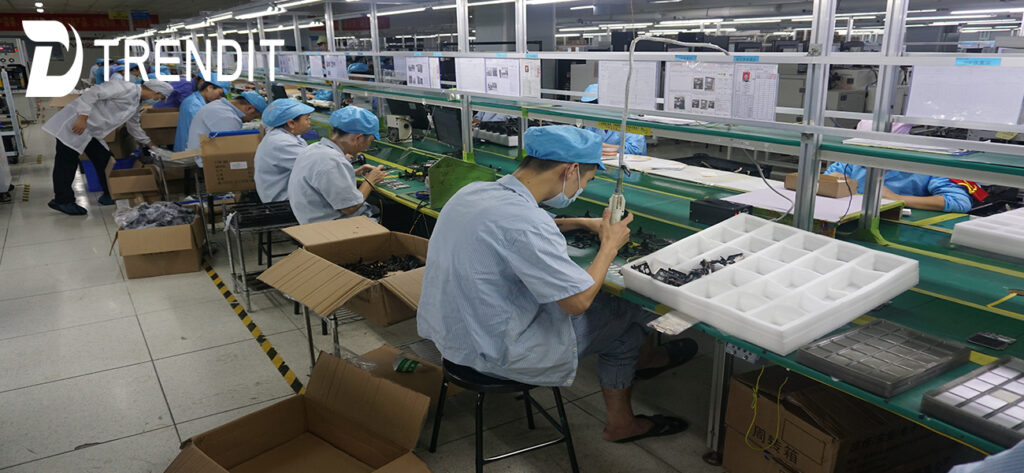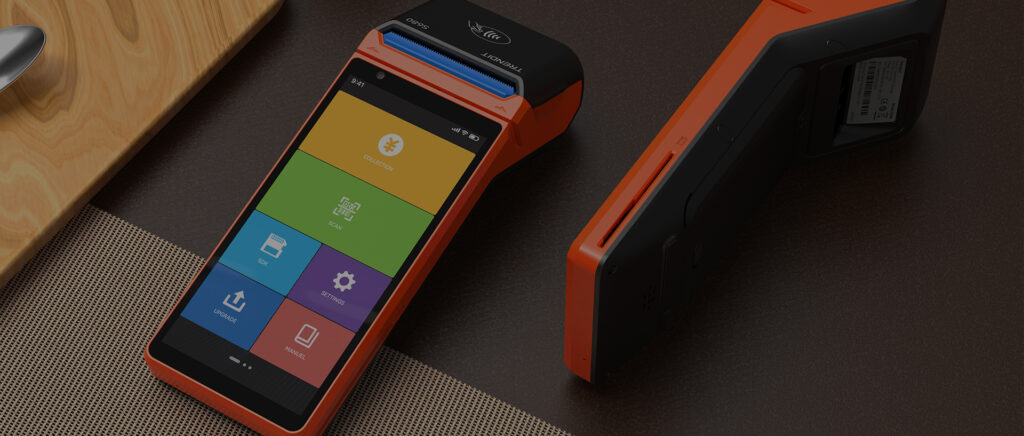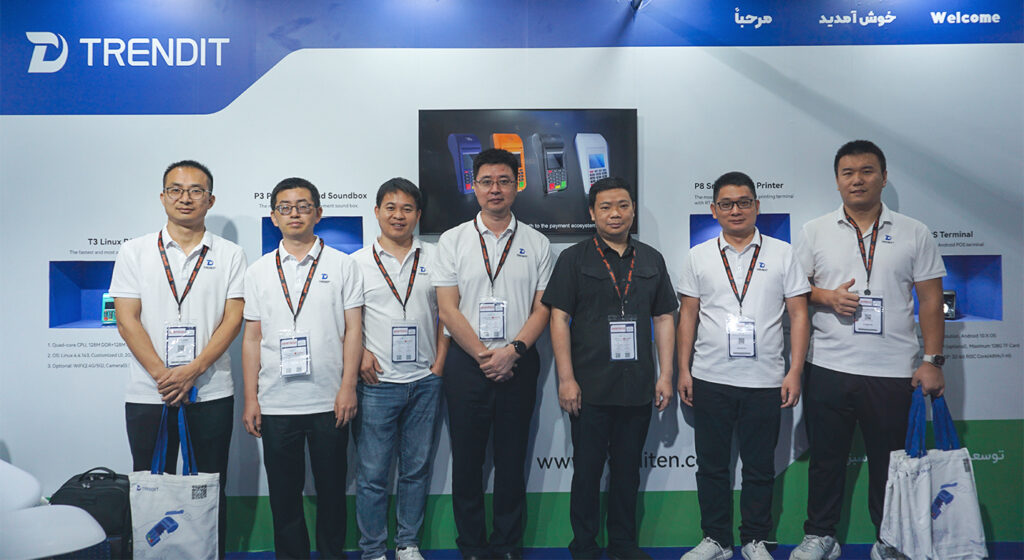Introduction
In the fast-paced world of retail, efficiency and innovation are not just advantageous—they are essential. As the industry continues to evolve, retailers are increasingly turning to cutting-edge technologies to enhance customer experiences and streamline operations. Among these technologies, smart POS (Point of Sale) systems stand out as pivotal tools. These systems are more than mere transactional hubs; they are integrated solutions that manage sales, inventory, customer data, and more, all while offering robust analytics to drive business decisions. In this article, we delve into the dynamic world of smart POS system manufacturers, highlighting how they are revolutionizing the retail landscape. From small boutiques to large chains, these manufacturers are equipping businesses with the tools needed to thrive in a digital era, ensuring that every transaction is not just a sale, but a step towards greater operational excellence. Join us as we uncover the leading players in this field and explore how their innovative solutions are shaping the future of retail.
Understanding Smart POS Systems
Redefining Retail Transactions: The Essence of Smart POS Systems
Smart POS systems represent a significant leap forward in the realm of retail technology, transforming how businesses process transactions and manage operations. At their core, these systems are sophisticated, multi-functional platforms designed to facilitate seamless payment processing, inventory management, and customer relationship management.
Unlike traditional cash registers, smart POS systems integrate advanced hardware and software to create a unified, efficient, and user-friendly interface. Whether running on Android POS Systems, Linux POS, or proprietary operating systems, these solutions offer a dynamic range of functionalities that cater to the diverse needs of modern retailers.
The Anatomy of Efficiency: Key Components and Features
A smart POS system is a constellation of various components working in harmony to enhance the retail experience. Central to these systems are POS terminals, which serve as the primary interface for transactions.
These terminals often feature touchscreens, barcode scanners, and receipt printers, enabling quick and accurate sales processing. Accompanying the hardware is the software suite, which includes inventory management tools, customer loyalty programs, and sales analytics.
Some systems also support handheld POS devices, allowing for mobile transactions and greater flexibility on the sales floor. Additionally, features such as cloud-based data storage, real-time reporting, and integration capabilities with other business systems set smart POS apart from their traditional counterparts.
Elevating Retail Efficiency: Advantages Over Traditional Systems
The shift from conventional cash registers to smart POS systems heralds numerous advantages for retailers. First and foremost, the integration of multiple functions into a single platform streamlines operations, reducing the need for separate devices and software applications.
This not only enhances efficiency but also minimizes the potential for errors. Smart POS systems provide invaluable insights through advanced analytics, helping businesses make informed decisions based on real-time data.
Enhanced security measures, including encryption and compliance with standards like PCI-DSS, protect sensitive information, ensuring customer trust. Moreover, the adaptability of these systems, whether through Android POS Systems or other flexible configurations, allows for easy updates and scalability, keeping businesses agile and competitive in a rapidly evolving market.

The Role of Manufacturers in the Smart POS Ecosystem
Architects of Innovation: Overview of Manufacturers’ Contributions
Manufacturers of smart POS systems are the bedrock of modern retail technology, driving the evolution of transactional interfaces from mere cash registers to sophisticated digital hubs. Their contributions extend beyond the mere production of hardware and software; they are pioneering advancements that redefine customer experiences and operational efficiencies.
By integrating cutting-edge technologies like cloud computing, AI, and IoT into their systems, manufacturers enable retailers to streamline operations, enhance customer engagement, and access real-time data analytics. These innovations, including versatile Android POS Systems and robust Linux POS options, empower retailers to adopt a more responsive and agile approach to market demands.
Mapping the Titans: Market Landscape and Major Players
The smart POS system market is a dynamic and competitive arena where innovation and efficiency meet. Among the key players in this bustling landscape is Trendit, a formidable manufacturer based in China. Ranked as the fourteenth leading POS system manufacturer in the country, Trendit has carved out a niche for itself by blending advanced technology with user-centric design. While giants like Square, Verifone, and Ingenico dominate the market with their extensive product lines and global presence, Trendit distinguishes itself through its keen focus on meeting the unique needs of the Chinese market. This strategic positioning allows Trendit to offer tailored solutions that cater to the specific demands of local retailers, setting them apart in a crowded field and demonstrating their commitment to innovation and quality in the smart POS industry.
Deciphering the Matrix: Factors Influencing Manufacturer Selection
Choosing the right smart POS system manufacturer is a critical decision that hinges on multiple factors tailored to the specific needs of the retailer. Key considerations include the scalability of the POS solution, the level of customer support, and the ease of integration with existing business systems. Retailers must evaluate whether a manufacturer’s offerings include comprehensive features such as robust security measures, compliance with industry standards, and support for various payment methods.
Additionally, the flexibility to customize and adapt the POS system—whether it be an Android POS System for user-friendly interfaces or a Linux POS for greater control and customization—plays a pivotal role in the decision-making process. The long-term partnership potential with the manufacturer, encompassing ongoing maintenance, software updates, and customer support, is equally paramount to ensure sustained operational efficiency and technological relevance.
Customization and Integration Capabilities
In the realm of smart POS manufacturing, customization and integration capabilities stand as pillars of innovation and efficiency. Customization enables retailers to tailor their POS systems according to specific business needs, whether it’s adding unique features, modifying user interfaces, or integrating third-party applications seamlessly.
This flexibility not only enhances user experience but also contributes significantly to operational efficiency and customer satisfaction. Manufacturers offering robust customization options empower businesses to optimize their workflows, adapt to evolving market demands, and differentiate themselves in a competitive landscape.

Tailoring Innovation to Fit Your Business
Hardware and Software Innovations
The continuous evolution of hardware and software components within smart POS systems is a testament to the dynamic nature of retail technology. Hardware innovations encompass advancements in POS terminals, including sleeker designs, enhanced durability, and expanded connectivity options such as NFC, Bluetooth, and Wi-Fi.
On the software front, manufacturers are focusing on intuitive user interfaces, cloud-based solutions for real-time data access, and AI-driven analytics for actionable insights. These innovations not only elevate the functionality of POS systems but also pave the way for future enhancements and adaptability to emerging technologies like Android POS System and Linux POS.
Pushing Boundaries, Redefining Possibilities
Security Measures and Compliance Standards
Amidst the digital transformation in retail, ensuring robust security measures and compliance standards is paramount for manufacturers and retailers alike. Smart POS systems integrate encryption technologies, tokenization, and EMV compliance to safeguard sensitive payment data and mitigate fraud risks.
Additionally, manufacturers prioritize adherence to industry standards such as PCI DSS (Payment Card Industry Data Security Standard) and GDPR (General Data Protection Regulation) to uphold data privacy and regulatory requirements. Proactive security measures not only protect businesses from potential threats but also foster trust among consumers, reinforcing brand reputation and loyalty.
Fortifying Trust, Safeguarding Transactions
# Navigating the Realm of Retail: A Comprehensive Overview of Smart POS System Manufacturers ## Deep Dive into Manufacturer Offerings ### Product Line Analysis
#### POS Terminals: The Heartbeat of Modern Retail In the dynamic world of retail, POS terminals are the linchpin that connects every transactional aspect of the business.
Smart POS systems, particularly those powered by versatile operating systems such as Android POS Systems and Linux POS, offer unparalleled flexibility and scalability. These terminals range from robust, stationary units designed for high-volume retail environments to sleek, portable models that cater to on-the-go sales scenarios.
The evolution of POS terminals has brought forth devices that integrate seamlessly with various peripherals, ensuring comprehensive data collection, inventory management, and customer relationship management. ### Software Solutions: The Brain Behind the Operations
Smart POS systems are not merely about hardware; the software driving these systems is crucial for optimizing retail operations. Software solutions in smart POS systems encompass a broad spectrum, including inventory tracking, sales reporting, customer loyalty programs, and employee management.
Advanced software platforms offer features like real-time analytics, cloud-based data storage, and remote accessibility, enabling retailers to make data-driven decisions. Manufacturers often provide customizable software options to cater to specific business needs, ensuring that retailers can tailor their systems for maximum efficiency and customer satisfaction.
### Peripheral Devices: Enhancing the POS Ecosystem Peripheral devices play a vital role in expanding the functionality of smart POS systems.
From barcode scanners and receipt printers to customer display screens and payment processing modules, these accessories ensure that retailers can deliver a seamless and efficient shopping experience. Handheld POS devices, in particular, have revolutionized retail by allowing sales associates to assist customers and process transactions anywhere on the sales floor.
The integration of these peripherals with the core POS terminal ensures a cohesive system that enhances operational fluidity and improves overall customer service. ### Pricing Models and Packages: Flexibility and Affordability
The pricing models and packages offered by smart POS system manufacturers are as varied as the retailers they serve. Manufacturers typically provide flexible pricing structures, including outright purchases, leasing options, and subscription-based models.
This flexibility allows businesses of all sizes to invest in cutting-edge POS technology without substantial upfront costs. Comprehensive packages often bundle hardware, software, and peripheral devices, providing a one-stop solution for retailers.
Additionally, many manufacturers offer scalable pricing, enabling retailers to upgrade their systems as their business grows and evolves. ### Case Studies and Success Stories: Real-World Applications
Real-world applications and success stories highlight the tangible benefits of adopting smart POS systems. For instance, a boutique retailer might share how an Android POS System streamlined their inventory management and enhanced customer engagement through integrated loyalty programs.
Similarly, a large chain store could demonstrate how implementing a Linux POS system improved transaction speed and reduced downtime, resulting in increased sales and customer satisfaction. These case studies not only illustrate the effectiveness of smart POS solutions but also provide valuable insights and inspiration for other retailers considering similar investments.

Future Trends and Innovations
Predictions for the Smart POS Industry
The trajectory of the smart POS industry is poised for exponential growth, with forecasts indicating a robust evolution. One prediction suggests a deeper integration of artificial intelligence (AI) and machine learning (ML) algorithms into POS systems, enhancing predictive analytics for inventory management, customer preferences, and fraud detection.
Moreover, the proliferation of cloud-based solutions will continue, enabling seamless scalability and remote management capabilities. As the retail landscape becomes increasingly omnichannel, smart POS systems are anticipated to adapt, offering enhanced synchronization between online and offline sales channels, facilitating personalized customer experiences and fostering brand loyalty.
Emerging Technologies and Applications
The realm of emerging technologies promises to revolutionize the functionality and versatility of smart POS systems. Augmented reality (AR) and virtual reality (VR) applications are anticipated to enhance the in-store shopping experience, allowing customers to visualize products in real-time before making a purchase.
Additionally, the advent of blockchain technology holds significant promise for secure transactions and transparent supply chain management, bolstering consumer trust and mitigating fraud risks. Furthermore, the integration of Internet of Things (IoT) devices, such as smart shelves and RFID tags, will enable real-time inventory tracking and automated replenishment, optimizing operational efficiency for retailers.
Implications for Manufacturers and Retailers
The rapid advancement of smart POS technologies presents both opportunities and challenges for manufacturers and retailers alike. Manufacturers must stay abreast of technological innovations and consumer preferences to remain competitive in the market. As retailers demand more customizable solutions tailored to their specific needs, manufacturers must prioritize flexibility and interoperability in their product offerings.
Moreover, the shift towards subscription-based pricing models and software-as-a-service (SaaS) solutions necessitates a reevaluation of revenue streams and business models within the manufacturing sector. For retailers, embracing these emerging technologies entails a paradigm shift in operational strategies, requiring investments in employee training, cybersecurity measures, and infrastructure upgrades.
However, the potential benefits in terms of increased efficiency, enhanced customer experiences, and competitive advantage justify these transformative endeavors. Ultimately, collaboration between manufacturers and retailers will be paramount in navigating the dynamic landscape of smart POS technology and driving innovation forward.

Unveiling the Hidden Gems: Lesser-Known Manufacturers
Exploring Boutique Manufacturers
Boutique manufacturers in the realm of smart POS systems represent a unique segment within the industry, often characterized by their specialized focus, innovative solutions, and personalized approach to catering to specific market niches. These manufacturers, although not as widely recognized as major players, often excel in delivering tailored solutions that meet the unique requirements of niche markets or industries. For instance, a boutique manufacturer might specialize in handheld POS devices optimized for small businesses or offer Linux POS systems designed for specific retail environments requiring robust customization capabilities.
Regional and Specialized Players
Regional and specialized players within the smart POS manufacturing landscape contribute significantly to the diversity and adaptability of solutions available to retailers. These players often have a deep understanding of local market dynamics, compliance standards, and customer preferences, allowing them to create region-specific or industry-specific POS systems. For example, a regional player in Asia might focus on developing Android POS systems tailored to the preferences and technological infrastructure prevalent in that market, incorporating features that resonate with local businesses and consumers.
Unique Selling Propositions and Market Niches
One of the defining characteristics of lesser-known smart POS manufacturers is their ability to carve out unique market niches and establish compelling selling propositions. These manufacturers differentiate themselves through a range of factors, such as specialization in certain industries like hospitality or healthcare, offering integrated solutions that combine hardware and software seamlessly, or prioritizing sustainability and eco-friendly practices in their product offerings. By leveraging these unique selling propositions, these manufacturers attract customers who prioritize specific functionalities or values in their POS systems, contributing to a more diverse and vibrant ecosystem within the smart POS industry.
Making Informed Decisions: Considerations for Retailers
Evaluation Criteria for Choosing a Manufacturer
When embarking on the journey of selecting a smart POS system manufacturer, retailers must meticulously evaluate various criteria to ensure they align with their business needs and goals. Firstly, assessing the manufacturer’s track record and reputation within the industry is paramount. This involves scrutinizing their experience, client testimonials, and case studies to gauge their reliability and efficacy.
Additionally, retailers should delve into the manufacturer’s portfolio to ascertain if their offerings encompass the requisite features and functionalities tailored to their specific retail environment. Furthermore, considering the manufacturer’s commitment to research and development can provide insights into their ability to adapt to evolving market trends and technological advancements, ensuring a future-proof investment.
Recommendations For Excellent POS System Companies
Trendit Technology is a first-class company specializing in stable transaction solutions, specializing in POS hardware and software to meet the diverse transaction needs of various industries. More than 2.5 million merchants choose their POS products and services every year, and their cloud printer and online ordering SAAS solutions are trusted by more than 300,000 merchants. Their products include static QR CODE payment sound box, Android POS terminal, and Linux POS machine,dynamic QR CODE payment sound box. wait. In addition, Trendit cloud printer has provided QR code payment services to more than 500,000 overseas customers, winning wide recognition and trust.
The company’s competitive edge stems from its robust research and development capabilities and stable supply chain partnerships. Annually, Trendit invests more than 10% of its profits in research and development, continually enhancing its core technologies. Through enduring collaborations with reliable suppliers, the company maintains advanced production processes and stringent quality inspection standards, ensuring timely product delivery and fulfillment of customer requirements.
Trendit Technology’s products hold industry certifications such as PCI, EMV, VISA, Mastercard, Discover, AMEX, CE, and FCC. They support customization and collaborative development for payment service providers, banks, and independent software vendors, offering tailored solutions to meet specific needs. Furthermore, they provide OEM, ODM, and CKD/SKD services for small-batch orders, aiding global agents in expanding their businesses.
Committed to creating value for customers, Trendit Technology ensures reliable and affordable transaction solutions. By partnering with them, clients gain access to cost-effective products, swift delivery, excellent customer experiences, and comprehensive after-sales support. Trendit Technology stands as a trusted partner for reliable transaction solutions.

Integration with Existing Systems
Seamless integration with existing systems is a critical aspect that retailers must prioritize when selecting a smart POS system manufacturer. Compatibility issues can lead to operational inefficiencies, data discrepancies, and customer dissatisfaction. Therefore, retailers should thoroughly assess the manufacturer’s compatibility with their current hardware, software, and infrastructure.
Whether it’s integrating with legacy systems, e-commerce platforms, or third-party applications, the chosen manufacturer should offer robust APIs, middleware, and interoperability solutions to facilitate smooth data flow and synchronization across all touchpoints. Moreover, evaluating the scalability and flexibility of the smart POS system ensures it can adapt and expand alongside the retailer’s evolving needs without disrupting day-to-day operations.
Long-Term Support and Maintenance Considerations
In the dynamic landscape of retail technology, long-term support and maintenance are indispensable factors that retailers cannot afford to overlook. Beyond the initial implementation phase, ongoing technical assistance, software updates, and troubleshooting support are essential for ensuring optimal performance and minimizing downtime. Retailers should ascertain the manufacturer’s commitment to providing timely and responsive customer support services, including dedicated helpdesk support, online resources, and onsite assistance if required.
Additionally, evaluating the manufacturer’s warranty policies, service level agreements (SLAs), and upgrade pathways can provide clarity on the cost implications and coverage for future maintenance and enhancements. By prioritizing a manufacturer that prioritizes customer satisfaction and partnership longevity, retailers can mitigate risks and maximize the return on their smart POS system investment.
Conclusion
As we wrap up our exploration of smart POS system manufacturers in the retail sector, it is clear that these technological innovators are not just part of the industry—they are driving its future. The advancements brought forth by companies like Trendit and other industry leaders are redefining what it means to operate in retail. These smart POS systems do more than process transactions; they enhance the entire retail experience by integrating sales, inventory management, and customer engagement into one seamless solution. With the continued push for digital transformation, the role of smart POS systems is becoming increasingly crucial, offering retailers the tools they need to stay competitive in a rapidly changing marketplace. As businesses adapt to these innovations, the potential for growth and efficiency seems boundless. The future of retail is here, and it is being shaped by the hands of those who dare to innovate and reimagine the possibilities of POS technology.
